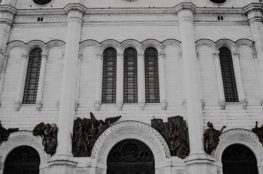Not long ago, I saw a HOPE photo used in the fundraising campaign of another organization. A different ministry was employing our tagline of “investing in the dreams of the poor” in one of their brochures. An additional organization had created field manuals that looked strikingly similar to some of ours. It didn’t look like a coincidence.
If we were a for-profit company, we’d probably have meetings on how to respond. Most likely, we’d be a little ticked off. Perhaps, we’d be talking to lawyers and drafting cease-and-desist letters.
But if we prioritize impact above organizational fame and identity, I have to celebrate that some of the pieces we’ve developed are being used by others. Nonprofit accountability isn’t tied to shareholder return, but to lives impacted. We should be most generous in supporting others eager to impact our broader mission. When we share information, causes win.
So I’ve started wondering, what would happen if we completely adopted the open-source model as an industry?
Here are a few case studies of ridiculously generous sharing of information and open innovation:
- EdX is a conglomeration of top universities that now offers many online courses for free. www.edx.org
- TED is an open forum of idea sharing from experts in science, technology, communication, medicine, art, business, and history. www.ted.com
- NASA held the largest “hackathon” in history to bring together the top minds to solve 58 problems facing space exploration. open.nasa.gov/blog/2013/04/22/the-power-of-mass-collaboration
- Khan Academy has as its mission to offer free world-class education for all. www.khanacademy.org
- LifeChurch.tv is changing the way people worship by enabling thousands to access its services online. www.lifechurch.tv
At HOPE, we hold no patents. We have no intellectual property. No covert operations. No worrying about whether or not someone might replicate what we do. And if there is anything we can do to help peer organizations, please let us know.
We’ve had other organizations share their learning with us – and it a privilege to share with others. Freely given. Freely give.
Let’s celebrate the shared outcomes and be more generous with anyone eager to join us in maximizing the good we can do.
P.S. But in the future, if you’d like to use something we’ve developed, please ask. We’ll be happy to share!




April 23, 2013
Refreshingly Kingdom focused thinking.
I couldn’t agree with you more. We can get caught up in the idea that we have to cover our costs and “competitiveadvantage” — and end up putting a price on the gospel or the spread of it. If we approach all of ministry with a true heart of generosity and a focus on God’s Kingdom rather than our own organizational kingdoms, I know we will find much more impact, satisfaction, and joy!
April 28, 2013
Thanks for your comment Keith. I agree – truly more blessed to give than receive.
April 23, 2013
As a photographer who works for one of the nations largest NGO’s I want to kindly share possibly a different perspective on this post, but I don’t suggest to undermine the heart of what you are saying.
I think knowledge sharing and not setting up fences is extremely important and there is quite a bit we can learn from each other if we are all willing. However, I feed my family specifically from the idea, hope, and legal protected position that people don’t ‘share’ my photography, design work, or hard-fought-after intellectual property.
In the opening example above if someone was using a photograph, it’s rare for a photographer to give up their copyright to even NGO’s and most likely you signed a usage agreement with your photographer. This is so that they don’t let other organizations use your projects images… organizations you MIGHT not agree with. It’s protects both you and the creative.
In this case, it’s actually money out of your photographers pocket and not necessarily yours. I find it, in a sense, undervaluing you art, photography, and design work and inadvertently promoting stealing.
Open information and copyrightable works from people who make a living through it are certainly not congruent. You are talking about ‘sharing information’ but the start of this post is about people ‘sharing’ your artwork and photography.
If someone asks for the shirt off our back, we are supposed give them our cloak too, however, we cannot (and really should not) condone stealing. I’d be curious as to where you’d draw the line on this.
All this to say, I hope I didn’t come off too strongly, but would urge you to consider the difference between sharing information that can do good and sharing copyrightable ‘works’ I hope I’ve done a decent and gentle enough job of demonstrating the difference between the two.
Blessing.
ed
April 28, 2013
Ed – really important comment. Due to the ease of Google images, photographers have been pillaged and it isn’t right. This blog was certainly not intended to condone stealing – if someone were essentially taking my paycheck, I’d be a bit ticked off. It was more to focus on the broader principles of sharing information within the nonprofit sector. Finding excellent photographers is rare – and it will be even more rare if we don’t find a way of protecting and rewarding their art. Again, I really appreciate your comment.
April 25, 2013
That is pretty amazing. You guys are an inspiration. It is encouraging to the world when the body works as one. Please keep fighting the good fight with Hope!
April 28, 2013
Thanks Dan!
April 25, 2013
This is why you are one of my favorite people!
April 28, 2013
Johnny – I greatly admire the way you live out the principles in this post, including the way you generously mentioned HOPE International in Orphan Justice!
May 4, 2013
I have to agree with Ed here and ad one more thought to the mix.
I was directed to this post because of a blog post I just finished writing on ethics and photography. The questions I raised needs to be asked here as well. Does the subject of the image have any say about how thier image is being used? Most photographers try to obtain a model release when the image is going to be used for commercial use. This isn’t just for licensing of the image, it’s also for protecting and informing the subject of how that image will be used. Hope International might be very prudent about how an image is used and be very careful. However the next organization to use it may not. Can you imagine a image of a Muslim man or woman being used in an evangelistic campaign? Those people would be mortified and your company’s goodwill would with the very people you are serving would be deeply undermined and at risk. So as you can see, there are many layers to this. It’s not only about profits and Intellectual copyright as Ed mentions. It’s also about ethics towards the people photograph. I’m sure there are other levels that we haven’t even touched.
May 7, 2013
Thank you, Matt, for your question and comments. Your point on ethics in photography is well-stated and deserves attention. While HOPE International does seek to be open-handed in sharing our experiences, methodologies and learnings with other organizations, we value more dearly the relationships and contractual agreements with our clients for whom our organization exists to serve, as well as the photographers who shoot on behalf of HOPE. As such, we are indeed careful not to extend photography usage rights from our library, including images of our clients, to uses that do not directly relate to sharing the story of transformation that occurs as an outcome of the work of HOPE International and our partners.
May 14, 2013
Wonderful concept, and think most appropriate like Hope Intl. embrace the ethos of openness. As a practical matter, Creative Commons has come up with several forms of open licensing arrangements. Doubtless, there’s a form that balances openness and prudence and recognition of authorship (or creation, etc.) I would recommend taking a look, if you haven’t already. http://creativecommons.org/
-(Yet another) Keith
June 14, 2013
Thanks Keith! I appreciate the info on creativecommons.org – first time I’ve heard of them. Come visit us in PA.
June 20, 2013
[…] Hope International: Leaders. Friends. And open-handed partners in this work. Read Peter Greer’s blog on open-source and Chris Horsts’ blog on tree-staking perils. As you can tell, they live these […]